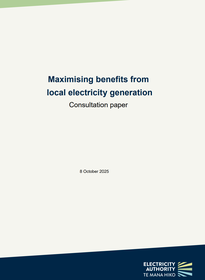Maximising benefits from local electricity generation
Consultation
This consultation sought feedback on proposals to make export limits more efficient, so residential solar, wind, solar farms and other distributed generation can supply more electricity to networks. Thanks to all who provided feedback - submissions are published below.
Export limits are caps on the amount of electricity that distributed generation can supply to networks at any one time. They are an important tool for distributors to manage the safety and reliability of their networks.
However, recent changes (eg, wider voltage limits) make this a sensible time to consider whether export limits could provide greater benefit to consumers.
We proposed four changes that would, in general, raise export limits, making them more efficient, while maintaining the safety and reliability of networks.
The proposed changes would require:
- a default 10kW export limit for small-scale distributed generation (such as residential solar) using the streamlined application process
- inverters to use the Australian voltage response settings, as defaults, when the streamlined application process is used, which increases export levels
- distributors to use an industry-developed methodology to set bespoke export limits for larger-scale distributed generation
- all distributed generation applications on low-voltage networks to use the latest inverter performance standard.
We are pleased to see that ahead of the Authority’s decisions, many distributors have voluntarily increased their export limits for residential connections to 10kW. Our tracker shows distributors’ progress voluntarily moving to this limit.
View progress tracker: Shift to 10kW export limits
The proposals in the consultation are the first major step to raise export limits to efficient levels, while giving distributors the tools they need to protect the network.
In future work, the Authority will consider further ways to increase the amount of electricity that can be shared from distributed generators, so consumers see the full benefits of this technology.
We expect more efficient export limits to help lower costs for all New Zealanders over time by maximising the benefits of distributed generation, reducing the need to generate high-cost electricity and build expensive new infrastructure.
More electricity from distributed generation would also help strengthen communities’ resilience to severe weather events and natural disasters, support better returns for distributed generators, and encourage investments in larger systems that have extra capacity to support networks.
Webinar
On Thursday 30 October 2025 we held a webinar to talk through our thinking and the proposed changes to maximise the benefits from local electricity generation, as detailed in the consultation paper. Watch the webinar recording and read the slide pack.
Submissions
-
Achan Bedi1 page
-
Andrew Broxholme1 page
-
Andrew Heal2 pages
-
Andy Gow1 page
-
Anonymous 11 page
-
Anonymous 22 pages
-
Aurora Energy Limited1 page
-
Ben Statham2 pages
-
Bevan Jenkins2 pages
-
Blaise St-Laurent1 page
-
Brendon Harvey1 page
-
Bruce Gulley2 pages
-
Buller Electricity limited2 pages
-
Chris Tuite1 page
-
Christopher Leigh1 page
-
Climate Justice Taranaki1 page
-
Compare Power Companies4 pages
-
Counties Energy Limited1 page
-
Craig Grant1 page
-
Craig Ward2 pages
-
D Richards2 pages
-
Dan Swan2 pages
-
Daniel Cull1 page
-
Daniel Hill2 pages
-
Derek Chapman5 pages
-
Drive Electric4 pages
-
Dunedin Airport2 pages
-
Dylan Romanos1 page
-
Eddie van Uden2 pages
-
EEA15 pages
-
Electrify Hawkes Bay2 pages
-
Electrify Kapiti5 pages
-
Electrify the hutt3 pages
-
Electrify Wairarapa3 pages
-
Electrify Wanaka3 pages
-
ENA14 pages
-
ERGANZ2 pages
-
Fiona Bretherton2 pages
-
Future Energy5 pages
-
G Winder2 pages
-
Gajan Shivanandan4 pages
-
Gaynor Hamill2 pages
-
Gill Sanson2 pages
-
Glenn Bosworth2 pages
-
Graeme Weston20 pages
-
Graham Eagles and Maryanne Smyth3 pages
-
Grant Cole2 pages
-
Hazel Mattewson1 page
-
Hiren Patel1 page
-
Ian Bell3 pages
-
IEGA2 pages
-
James Scott3 pages
-
James Siddle1 page
-
Jeremy Mills-Houlihan1 page
-
John Mansell4 pages
-
Jude Sanson2 pages
-
Juliet Tainui-Hernandez2 pages
-
Kelly Clow2 pages
-
Kristin D'Agostino2 pages
-
Lachlan Russell2 pages
-
Laydan Mortensen6 pages
-
Liam Sergeant1 page
-
Lisa Dohig2 pages
-
Low Carbon Kapiti5 pages
-
Lynne & Brian Tomas2 pages
-
MARL6 pages
-
Martin Kane3 pages
-
Martino Di Marco2 pages
-
Mat Whinney2 pages
-
Matt Dempsey15 pages
-
Matt Savage2 pages
-
Matthew Oldham4 pages
-
Merryn Hedley & Terry Webb4 pages
-
Michael Anderson2 pages
-
Milan Radojevic1 page
-
Nathan Collis4 pages
-
Nathan Surendran2 pages
-
Neil Pride1 page
-
Nick Biland2 pages
-
Nu'uali'itia Andrew Redwood7 pages
-
Orion14 pages
-
Paul O'Donoghue2 pages
-
Philip D'Ath3 pages
-
Powerco9 pages
-
Powernet12 pages
-
Retyna4 pages
-
Rewiring Aotearoa17 pages
-
Rob Jones (Grid breaker)2 pages
-
Rob Mccaw2 pages
-
Rob van Duivenboden1 page
-
Robert Bogers3 pages
-
Ryan Radecki1 page
-
SEANZ4 pages
-
Simon Cope1 page
-
Simon Vincent2 pages
-
Solayer2 pages
-
Steve Southall2 pages
-
Stewart Sanson2 pages
-
Stuart Wakefield2 pages
-
Supa Energy3 pages
-
Tarun Sharma10 pages
-
Tim - Avocado tours1 page
-
Tim Hawker4 pages
-
Tony Daamen5 pages
-
Top Energy10 pages
-
Ulrich Speidel8 pages
-
Unison and Centralines22 pages
-
Uttam Floray2 pages
-
Vector19 pages
-
Warrick Isaachsen2 pages
-
Wayne Ridgway1 page
-
WEL Networks6 pages
-
Wellington Electricity10 pages
-
Westpower4 pages
